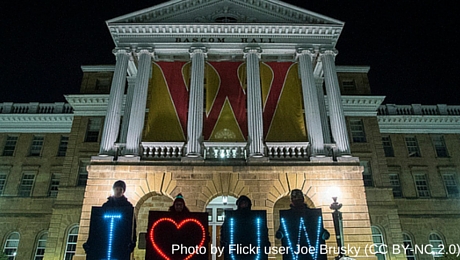
(Cross-posted from languagepolitics.org)
The UW-Madison Faculty Senate will vote on a resolution of no confidence in UW System President Ray Cross and the Board of Regents on Monday. The proximate cause is the egregious handling of Madison’s faculty layoff policy by System legal counsel, Cross, and the Regents, all of which is detailed at length in the text of the resolution. A further contributing factor is Cross’s much-publicized decision to scrap the Chancellors’ presentations on the effects of the 2015–17 budget cuts at the Regents meeting earlier this month (“no whining!”). All of this is set against the backdrop of the nonstop crisis that has been with us since Scott Walker unveiled his 2015–17 budget proposal fifteen months ago, starting with Cross’s questionable and ill-fated decision to advocate a public authority model for the university system, and continuing through the gutting of shared governance, the weakening of tenure, and the soft-pedaling of the cuts’ fallout.
The prospect of a no confidence vote has caused a surprising number of legislators to lose their minds. When a purely symbolic gesture by faculty elicits immediate threats of material retaliation from a powerful State Senator, it’s because it hits uncomfortably close to the mark. Those Republican legislators who have weighed in have, predictably, played the class resentment card against faculty in an attempt to divert attention from the substance of the complaint. In the current Wisconsin context, this means invoking the four-year tuition freeze early and often, and accusing faculty of not caring about tuition-paying students and families. (No one ever bothers to explain how weakening tenure and shared governance will prevent tuition from rising, of course.)
Tuition had been in the news even before the no confidence resolution came to light. At the most recent UWM budget forum, Chancellor Mark Mone repeated his (and, by extension, UW System leadership’s) hope that the Legislature will allow for a modest tuition increase in the next budget. This led Rep. Dale Kooyenga to opine, “I just don’t get how the left can say the tuition cap is bad but yet many of the same people are ‘feeling the Bern,’ saying we need to have free college altogether.” UW leadership is displaying the same political cluelessness around tuition that it did in the early public authority days, and legislators are wasting no time using administrators’ remarks as a pretext for beating faculty senseless. (And if Mark Mone voted for Bernie Sanders, I will eat ALL THE HATS.)
So let’s be clear: I know I speak for many UW faculty when I say that we endorse the tuition freeze and want it to continue. If anything, tuition should be decreased. But a tuition freeze has to be funded by the Legislature. Right now, the UW System is in the midst of a four-year unfunded mandate coupled with steep cuts in base funding, and it is hurting students. A tuition freeze does no good when you can’t enroll in the classes you need and end up taking longer to graduate. It does no good when it means the program you wanted to major in has to shut down. Shifting costs away from students is the morally correct thing to do; declining to fund those shifted costs is pure deception.
All of which brings us back to the no confidence resolution. The only way to contain tuition costs is for the state to agree to bear those costs through increased funding to the system. The only way to get the state to increase funding is to make a compelling case to the public that our current path is harming students and families. Ray Cross has moved, instead, to stifle public discussion of the cuts’ effects. The Board of Regents has adopted tenure and layoff policies that will make it easier to accommodate continued austerity, and that will thus encourage additional cuts. This is the heart of the case for no confidence.
Faculty are on the side of students and families. Fund the freeze, fund a tuition decrease, restore our public commitment to public higher education.



I hope UW-Madison takes a lesson from how Saint Louis University handled our crisis. We had our strategy committee, our information committee, and our communications committee. The strategy committee plotted out our path, detailing the jobs of finding what people thought and how the university had declined to the information committee, and then leaving it to the information committee to commandeer public opinion through tactical use of newspaper, TV, social media, and so on. AAUP chapter was the public face of the opposition, but it took far more wheels grinding below the surface to make the whole enterprise of opposition run. And we were completely successful, with the president dismissed by the Board of Trustees 9 months after the vote of No Confidence.
But it’s a much harder case to run up against the Board. That means you have to make your case to someone of greater authority. Proximately, that’s the legislature–which is not in the university’s corner. So the ultimate source of authority must be invoked: the people. That must be the aim of all activity, the focus of every communiqué, the inspiration for all plans. Else it’s an exercise in venting, nothing more.
This is what successful revolution looks like:
https://sites.google.com/a/slu.edu/aaup-slu-interim/home/current-issues
Stacey Harris, president, SLU AAUP Chapter
Pingback: Fund the Freeze | REMAKING THE UNIVERSITY